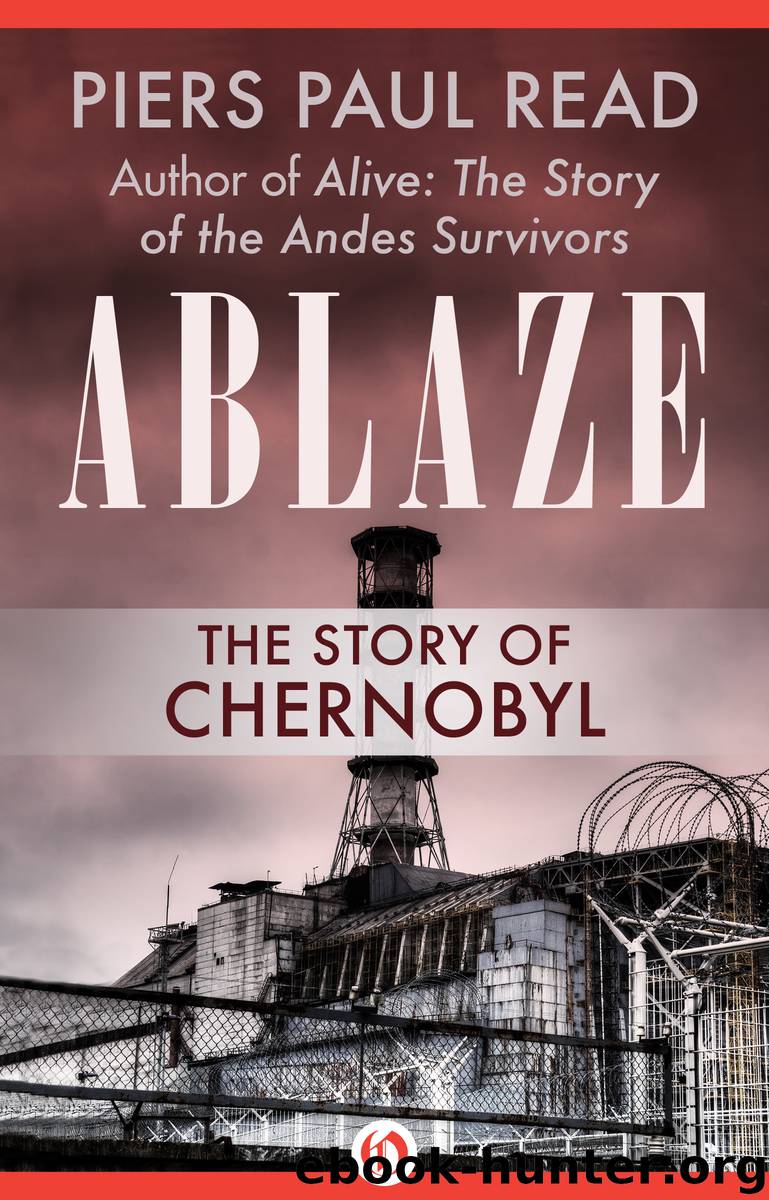Ablaze by Read Piers Paul;

Author:Read, Piers Paul;
Language: eng
Format: epub
Publisher: Open Road Media
Published: 2016-06-21T04:00:00+00:00
4
The information about the accident, cautiously and selectively imparted through the Soviet media, did little to reassure the citizens of Kiev. Clips of film showing cows grazing in the shadow of the reactor, which had been broadcast on television in the days that followed the accident, were now revealed as lies to a public already prone to distrust any form of official propaganda. They were more willing to believe the news that filtered in from Radio Liberty, the BBC or simple telephone calls from friends abroad, that Western governments were repatriating their citizens from all parts of the Soviet Union.
Controlled by the system of internal passports and unable to leave their jobs without good reason, workers in offices and factories in Kiev now put in for their vacations, paid or unpaid, and when these were refused even proffered their resignations. On the night of 5 May, people slept at the railway station to keep their place in the queue for tickets. By the next morning the ticket offices came under siege, and soon the only seats available were on planes and trains departing five or six days later. Pensioners and invalids from the Great Patriotic War, who had precedence, were brutally elbowed aside as parents scrambled to get tickets for their children. A brisk black market sprang up, and tickets were sold for a premium of fifty or one hundred rubles.
On 6 May, ten days after the accident, at the same time as the first descriptions of it were published in the press, local radio and television stations broadcast the first advice to the inhabitants of Kiev by the Ukrainian health minister, Anatoli Romanenko. This was to wash their vegetables, close their windows and remain indoors. Many preferred to try to leave. Rumours began to circulate about how the party leaders had sent their children and grandchildren to camps and sanatoriums in the Crimea as soon as the accident had occurred. Crowds formed at the banks, and some banks were forced to close only an hour or two after they had opened. Others limited withdrawals to one hundred rubles, but even that depleted their deposits, and by the afternoon of 6 May the banks in Kiev closed because they had run out of money. Those people with cars now tried to flee, and traffic jammed the southern routes out of the city.
Those who remained, hearing that iodine was a precaution against radiation, flocked to pharmacies, but found that the stocks had sold out. Some got hold of iodine intended for external application, drank it down and scalded their throats. The other reputed antidote was vodka, and the usual lines outside the liquor stores quadrupled in size. The short opening hours decreed on 1 May as part of the drive against alcoholism were abandoned. Believing themselves protected by their intoxication, drunks ventured out in the street. A group tried to pick up a dishevelled young woman in the Khreshchatyk boulevard; it was Lubov Kovalevskaya, the journalist from Pripyat, who had just
Download
This site does not store any files on its server. We only index and link to content provided by other sites. Please contact the content providers to delete copyright contents if any and email us, we'll remove relevant links or contents immediately.
SAS Survival Handbook by John 'Lofty' Wiseman(2723)
Food and Water in an Emergency by Food & Water In An Emergency(2407)
Dangerous Personalities by Joe Navarro(2289)
Sea Survival Handbook by Keith Colwell(2243)
First Aid Handbook--Crucial Survival Skills, Emergency Procedures & Lifesaving Medical Information by Department of the Army(1839)
The Survival Medicine Handbook: A guide for when help is NOT on the way by Joseph Alton & Amy Alton(1833)
100 Skills You'll Need for the End of the World (as We Know It) by Ana Maria Spagna(1705)
The Survival Savvy Family by Julie Sczerbinski(1694)
TWA 800 by Jack Cashill(1653)
Sheep No More by Jonathan T. Gilliam(1641)
Prepper's Survival Medicine Handbook: A Lifesaving Collection of Emergency Procedures from U.S. Army Field Manuals by Scott Finazzo(1614)
Spy Secrets That Can Save Your Life: A Former CIA Officer Reveals Safety and Survival Techniques to Keep You and Your Family Protected by Jason Hanson(1605)
The Complete U.S. Army Survival Guide to Foraging Skills, Tactics, and Techniques by Jay McCullough(1534)
The Natural First Aid Handbook by Brigitte Mars(1463)
The Emergency Survival Manual by Joseph Pred(1459)
Be a Hero by John Geddes(1427)
Joey Green's Magic Health Remedies by Joey Green(1360)
The Zombie Survival Guide by Max Brooks(1348)
Poisoned by Jeff Benedict(1314)
